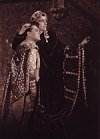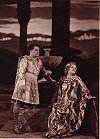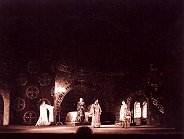|
|
|
Photogallery
|
 |
 |
 |
Ian Lace describes Respighi's opera - and Nelly Miricioiu, who has sung Silvana in a recent Rome Opera production, offers her impressions of the role.
La Fiamma was first performed on January 23rd 1934 in the Royal Opera House in Rome with Respighi, himself, conducting and Giuseppina Cobelli in the leading role of Silvana. The opera was very well received and its success surpassed that of the composer's other stage works. Performances followed in Buenos Aires and Chicago in the same year, and at La Scala and in Budapest in 1935. Further productions were staged in Berlin (1936) and Vienna (1937). In Budapest, the opera was performed 32 times and the Budapest company took its production to Florence in 1938 and to La Scala in 1940 with great success. Appropriately, then, Hungaroton produced the very first recording of the work in 1995 and a discussion/review of it is the backbone of this article.La Fiamma is a post Romantic grand opera. The libretto is based on the play "Anne Pedersdotter, The Witch" by Han Wiers-Jenssen (1866-1925), but transposed to Bisance It is structurally impressive with cohesive broad spans and large-scale symmetrical conformities - for example the grand finales of the first and third acts correspond to each other. Both have mass scenes involving hysterical trials for witchcraft, using freely interpreted "ceremonial music in the Byzantine style". Respighi's love of ancient modes is often evident, Gregorian chant and the old tonalities and the orchestrations of old arias and dances being transferred to the world of grand opera. Respighi the impressionist is also subtly apparent in some of his orchestrations and tonal writing. La Fiamma employs a large but not a mammoth orchestra; however, all the instruments are rarely played together for this is a score of "many grave, compact sounds and dark shades." This sparing use of colour does not mean that the opera lacks the expressiveness that Respighi learnt from Richard Strauss, but that this expressiveness is reserved more for the richly chromatic vocal parts that vividly express the opera's basic ideas and fundamental moods: sultriness, stifled or erupting eroticism, morbidity, eccentricity, perversion, hysteria, fear and fatalism. Respighi had earlier explored supernatural forces in his comic opera Belfagor (1922) about a minor, buffoonish devil who is sent up from hell to find out why so many incoming men are blaming marriage for their fall.
Interestingly, Carl Theodor Dreyer did a sound film of La Fiamma in 1945, entitled "Vredens Dag" (Day of Wrath) and Norwegian composer Edvard Fliflet Braein (1924-1976) wrote an opera on the same play, called "Anne Pedersdotter", which is available on Simax CD PSC 3121
La Fiamma, set in 7th century Ravenna, opens in the Exarch Basilio's summer residence set between the coast and a dense pine forest. Basilio's severe and aged mother, Eudossia, is supervising the servant's weaving. The music is dark, fatalistic, threatening - almost stifling - with swirling strings suggesting superstition and menace. Out of these figures grows the chanting of the servant girls - to a rather oriental melody - as they work; the orchestra evoking their interminable spinning. Eudossia (sung suitably domineeringly by Klára Takács) admonishes Monica and the girls to concentrate on their work and pray. This oppressive atmosphere is keenly felt by Silvana, Basilio's young second wife who is also present. When Eudossia exits, a sweeter, more serene melody follows, pastoral in character, with a prominent part for the oboe; again, with humming chorus. The music lightens further as the girls, now unsupervised, laugh and chatter. But the mood is shadowed by talk of witches and witchcraft. In her first main aria, Silvana (Ilona Tokody) confides in Monica that she is unhappy in Basilio's palace; she misses "... the sun, the sea and the wind..." The aria with its beautiful lines and impressionistic music contrasts the warmth of dreams and freedom with the chill of entrapment. Then the crowds outside are heard chasing Agnese di Cervia, whom the people of Ravenna have accused of witchcraft and infanticide. Horror and hysteria is conveyed by chorus and orchestra. Agnese (Tamara Takáks), panicking and wheedling, appears before Silvana, now alone, and appeals for concealment. Agnese eventually persuades Silvana to hide her. Silvana bids her swear she has made no pact with the devil but Agnese avoids taking the oath by making veiled allusions.
The handsome Donello, Basilio's son, arrives after a long absence. Donello (a dashingly romantic Péter Kelen) greets his father's new wife, Silvana. In the lovely aria/duet "The Meadow where I used to play" he reminisces about his youth in the beauty of the countryside and he seems to remember Silvana who confirms that they had met once before. Silvana, then a little girl, had seen Donello with an injured companion. Donello then remembers that she took them to the hut of Agnese. The orchestra tells us that Silvana remembers the event with much more affection than she speaks of. Eudossia enters and greets her son and in an exchange of religious intensity, they speak of their homage to the Church, their loyalty to Empress Irene, and of their beloved Byzantium from which they have been exiled. Now Agnese is discovered in the house and dragged out to her execution. Agnese is hysterical, beseeching that she is innocent but the chorus is adamant she is guilty. The people demand her blood - "To the stake!", they cry - the whole scene is full-blooded and builds up to a huge climax, the calmer church singing of the clergy contrasting dramatically with the heated clamour of the crowd.
Act II, set in various rooms of Basilio's palace, opens with Donello slyly but lightly teasing the servant girls. He tells them that a clothed statue remains demure when virgins pass but sheds her clothes when easier ladies go by. This is Respighi giving us some delightful light relief before the music darkens for the drama that quickly follows. Silvana enters and confronts Monica who admits to have fallen in love with Donello. In an often beautiful but emotionally complex aria, Silvana warns Monica that her love cannot be, that Donello is merely playing with her affections. Monica is banished to a convent. The orchestral accompaniment quite clearly tells us that Silvana is jealous. Basilio (a commanding Sándor Sólyom-Nagy) enters with his court. As the champion of orthodoxy, he is obliged to prepare for war on the Pope who has been proclaimed a heretic. When Basilio, Donello and Silvano are left alone, Silvana demands that Donello tell her what was said at Agnese's execution. Donello confirms her fear that Agnese had cried out from the stake that Silvana, whose mother had once employed witchcraft to force the Exarch to marry her daughter, had concealed Agnese. An outraged Basilio orders that anyone who spreads the witch's lie will have their tongue cut out. But when left alone with Silvana, Basilio, in another emotionally wide-ranging aria, confesses that Agnese had told the truth and that he had at first succumbed to the spell and fallen for Silvana, but that now he loves his wife truly and has been in penance ever since. To ever-darkening, brooding and threatening music, Silvana is at first shocked and filled with horror by Basilio's revelation but then she is consumed with curiosity wondering whether she, herself, possesses such awesome powers. Basilio urges her to cast aside such thoughts and to pray but left alone, Silvana puts herself to the test; she whispers Donello's name, he appears and they fall into each other's arms! Respighi's music in these last moments of Act II fairly whiffs of fire and brimstone.
Act III opens in Donello's room in the palace. He and Silvana are alone. The dramatic orchestral prelude suggests frenzied, illicit passion and tragic foreboding. As the textures thin the two lovers sing ardently of their passion: Silvana of her sexual awakening after "an eternal winter dream" and Donello, torn between rapture and a desire to escape his bewitchment: "What delicious potion did you pour for me..", but eventually his passion wins. This lengthy ecstatic and dramatic duet has elements of Richard Strauss and Puccini. The lovers are separated in their embrace by the arrival of Eudossia who utters dark hints as the situation becomes clear to her. Enmity between the two women is immediately apparent. Eudossia detains Silvana pending the arrival of Basilio. He arrives and it is apparent that he is now an old and broken man. In a tense exchange between father and son, Basilio informs Donello that the Empress has commanded his return to Byzantium. Emphatically, Donello at first resists then in his dramatic aria "Is that what you want… ", he feels that fate has offered him the chance to free himself of his passion and he exits quickly leaving Silvana alone with Basilio. Left alone together Basilio and Silvana regret Donello's departure; Silvana accusing Basilio's mother of an intrigue to rob her of Donello's love. When Basilio tries to defend Eudossia, Silvana rounds on him venting all her frustration and rage on him accusing him of robbing her of her youth and telling him that she has been wishing he was dead for a long time. In this vicious aria, "Don't touch me...", Ilona Tokody seizes all her melodramatic opportunities. The vehemence of this withering attack causes Basilio to have a fatal heart attack. Eudossia rushes in and accuses Silvana - "You! You killed him witch!" Silvana is brought to the tribunal of the Church where she pleads her innocence. She claims that although she has erred in yielding to her passion, she is neither a witch nor the murderer of her husband but a victim of circumstance. Donello, too, asks that she be absolved. But then Eudossia reminds the tribunal about Agnese's accusations and demands judgement on Silvana who is then ordered to prove her innocence by swearing on a reliquary. A doubting Donello urges her to do so. His hesitancy causes Silvana to break down and she is unable to repeat the oath after the bishop and so in the eyes of the people she is damned. The bishop raises his hand to curse her and the crowd cringes back in horror crying out - "Witch! " Like the end of Act I, this final set piece is truly awesome. There is the might and dignity of the Church with on and off-stage Gregorian-style choruses, supported by Respighi's resplendent modern orchestral colours. Then there is Silvana's anguished and poignant appeal against the bishop's pointed accusations, "Not for wickedness but for the desire of love..." followed by a sympathetic women's chorus and Donello's humble but ardent offer of self-sacrifice, "Bishop, absolve her...let me suffer the most severe punishment", the effect of which is quashed by Eudossia (Klara Takaks at her most venomous with the orchestra spitting malice). The chorus "Defend yourself..." superimposed by the passionate declamations of the principals is another theatrical triumph so, too, is the impact of closing scene with Silvana's collapse and condemnation.
In conclusion, it is interesting to note that Respighi choses to call his opera La Fiamma (The Flame) rather than, for instance, "The Witch". In doing so Respighi is subtly pointing up the main theme of his opera which is the flame of love; love - in all its ramifications, happy and fulfilling yet also destructive; but always eternal and unquenchable.
Maestro Gardelli and his forces have recorded a splendidly dramatic and atmospheric account of this powerful work.
[The recording: Respighi - La Fiamma Ilona Tokody; Klára Takács; Péter Kelen; Sándor Sólyom-Nagy; the Hungarian Radio and Television Chorus and the Hungarian State Orchestra conducted by Lamberto Gardelli - HUNGAROTON HCD 12591-93. It should be noted that this recording is not available in every country; one cannot buy it in the UK for instance. Keen Society members are advised to contact Hungaroton to negotiate a purchase; their e-mail address is: hungaroton@mail.hungaroton.hu.].
A new recording of a live performance by the Rome Opera of La Fiamma is to be released this year -
Nelly Miricioiu speaks about her role as Silvana
"Having sung the role of Silvana in "La Fiamma" (Rome Opera's Dec 1997) I was already a great admirer of Respighi's achievement in this opera and I now count it amongst my favourite roles. In fact a live recording is about to be released on the AGORA label which I hope will add to his cause and prove just how good this opera is. In any event, for me, it was a revelation that provided me with a dramatic and vocal framework which both surprised and impressed me with its power. All the performances were very successful and the audiences responded extremely well to Respighi's dramatic opera, which until this time, had been my only experience of his music except for a few songs which I include in recitals.
"When I first looked through the score of La Fiamma, I loved Respighi's sense of drama, and the depth of the work. It is expressively very strongly and so it is really just up my street. The role of Silvana, for me, is so rich in variety and sensation. There is beauty and vulnerability in the role for Silvana is a victim of circumstances; she is loving, sensuous and strong - and intelligent.
"I loved the first act duet with the tenor which is like using a palette to paint, but my very favourite moment is when she explains all her frustrations to her husband just before he dies......what a release! - musically! And yet the moment with the tenor....."Dolce la morte" in the second act is so still, so beautiful - the tune as much as the words.
"La Fiamma was a revelation for me, through which I discovered a new genre which I could sing (in Italian). Technically, it is not easy and I spent a long time trying to learn how to serve the music in the very best way I could. It felt difficult most of the time but when it came together each note proved worth the effort because of its intelligence as much as the music's beauty and passion.
"Were it up to me I would love to record/perform more of Respighi opera's but for the moment there are no plans. I have a video to show anyone interested, what a worthy opera "La Fiamma" is to put on-stage, and of course the recording should be available soon. In any event, I will be trying very hard to bring it to the attention of anyone who may be interested. Having only just discovered Respighi, I don't know enough to say which of his operas I would choose and indeed the only other opera I've heard is "Lucrezia" which I like but its quite short to stage. I already perform a very wide repertoire but I think Respighi is the most modern of the opera's I've tackled.
"Of Respighi's songs I have sung: Notturno, Pioggia, Ma come potrei, L'ultima ebbrezza and L'invito alla danza. These are my favourites and they formed part of a recorded recital I gave at the Wigmore Hall in 1985. They are all beautifully lyrical and have great charm; and I still like to sing them when the occasion arises. In fact I chose Notturno to musically accompany my wedding (video) because it is so evocative."
[The Romanian-born soprano, Nelly Miricioiu's repertoire proves her to be one of today's most versatile artists. Her repertoire extends from the title roles in Donizetti's Maria Stuarda, Anna Bolena, Roberto Devereux to Puccini's Tosca and Verdi's La Traviata. She made her Covent Garden debut in 1982 as Nedda in I Pagliacci and, in the following year, she made her triumphant La Scala debut as Lucia di Lammermoor. Since then, she has worked with some of the most prestigious conductors, directors and singers including Jose Carreras, Placido Domingo and Roberto Alagna. She is renowned for her singing of Violetta in La Traviata. Her repertoire also includes great bel canto heroines. Her Armenaide (Tancredi) has been greatly admired.Recent roles have included Fedora in Buenos Aires, Semiramide in Geneva, Norma in Amsterdam. Future performances are scheduled of Norma in Rome, Athens and with the ROH Covent Garden (Concert), Tosca in Munich and at the ROH Covent Garden and Adriana Lecouvreur at LaScala. Details about the availabilty of the CD of La Fiamma from the Rome recording can be found on Nelly Miricioiu's webpage: http://www.opera-singer.com}